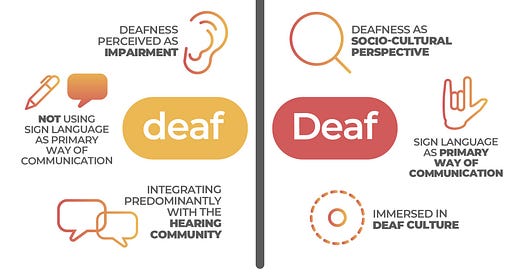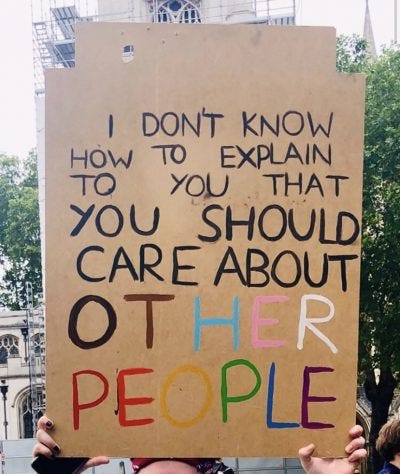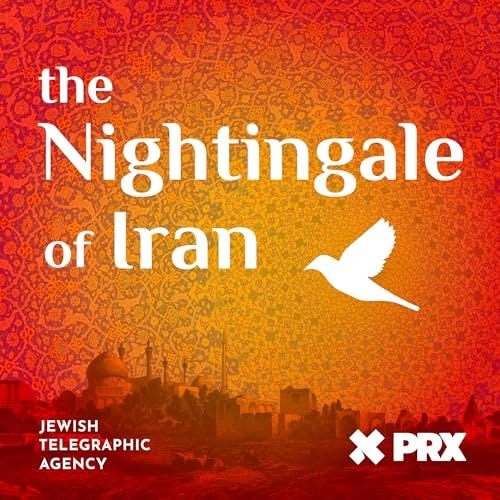Hi hello, Wil Williams writing! If you’ve followed my writing in the past, there’s a pretty good chance that you know I care a lot about accessibility. I am disabled, and many, many of my friends are disabled, whether their disabilities come in the form of neurodivergence, chronic illnesses, physical disabilities, or — importantly, to this issue — being d/Deaf.
Image via Project Easier — see the link above! To be clear, Deaf folks do not necessarily see themselves as disabled or impaired.
Did you know there are d/Deaf podcast audiences? Many people don’t, and they should. Audio is a whole medium that is largely walled off from many, many disabled folks, and that’s true in regards to how podcast marketing works as well. Let’s talk about it.
Do you have transcripts, and do your swaps?
Transcripts are often seen as an unnecessary expenditure of time, funds, and energy for podcasters. This always surprises me at least for podcasters in the States, given both the FCC and ADA have requirements for closed captions on video. I don’t see the ADA requirements as just legal mandates; I see them as pretty much the bare minimum you could do to show up for disabled people. The difference between closed captions on video and transcripts is negligible to me; the important concept is not what is nitty-gritty required, but instead, what is inclusive and kind.
Don’t just take it from me, though. Please please please read this lovely piece on trancripts by C. N. Josephs.
Image from Wellness For All; quote not from Anthony Fauci, as many think, but from Kayla Chadwick of HuffPost.
I am not someone who needs transcripts, but I am someone who benefits greatly from them — not just for the purposes of engaging with a podcast, but for the purposes of writing about podcasts. It’s nice having assurance that I’m spelling everyone’s names right, and it’s a huge help when I want to use a quote from an episode in my coverage. If you have transcripts, you are making things easier on bloggers, newsletter writers, and journalists, and it’s never bad to make a good impression when you want the press talking about your work.
And, of course, the crux of this is that if your podcast has baked-in ads, promo swaps, etc., you should also make sure you have transcripts for those. This can be more difficult for dynamically inserted content, of course — and if you have any thoughts on how to transcribe those well, I’d be so happy to know!
If you’re worried about the heavy lift of transcripts, great news: it’s easier than ever, especially with Apple Podcasts providing auto-transcripts that you can download and put on your own site. I do not know how good they are yet, so please be sure you’re looking them over for accuracy!
How patient are you?
Until recently, one of my chronic illnesses caused me to be bedridden in pain for about two weeks a month. You might be thinking, “But Wil, that’s half the month. That’s half of your life that you live.” Astute and correct! This meant that while I was working, I was also working through pain so bad I couldn’t stand up. As you can, I hope, imagine, this means I sometimes had to work a little slower than I would like. I needed some more patience if people wanted to work with me. I am one of the lucky few whose treatment worked, and I’m now only down for the count maybe a two or three days each month.
How patient are you being with your marketing partners? Are you following up every single day? Do you have expectations for speedy responses? Do you stop working with marketing partners who get back to you later than expected? Do you push a sense of urgency?
We all know that marketing a podcast around timely events (new seasons, launch dates, big-name guests) is fantastic. It’s not everything, though. Podcasts are not often ephemeral. People can listen to them even if they’ve long since ended. If someone is taking a little longer getting back to you, try giving them the benefit of the doubt. We all have messy, chaotic lives, and some of us are struggling even more.
How direct and explicit are you?
In the States, at least, there is sometimes a culture around not directly saying what you mean or asking for you want. Instead of saying, “I’d like to eat pizza for dinner tonight,” it can feel more natural to say, “Do you want to get pizza tonight?” Many people understand these two statements as the same thing — but many others do not. They are, literally speaking, two different questions; the similarity is not in the words, but in the cultural implicit meaning that is not implicit for plenty of folks, especially those who are neurodivergent.
First up: don’t ever think you know if someone is neurodivergent and assume you can skip over any accommodation. I am neurodivergent — not in ways that impact my understanding of phrases like above, but in ways that impact my life nonetheless. Also: saying, “But you don’t seem neurodivergent!” is not a compliment, oh my god, oh my godddddd.
Also, like, let’s be real: speaking clearly, directly, and explicitly benefits everyone. Making sure you’re on the same page benefits everyone. If you want to run a promo swap on X day for Y impressions, say that directly. If you don’t want to do a promo swap with someone, say that directly, which yes, you can do in a kind way. If you are expecting a response by a certain date, say that.
One last thing
In my experience, a lot of folks who don’t know many disabled people seem to feel put out by requests for accommodation for what they think of as a “small group.” Disability is not a small population, and everyone is at risk of someday becoming disabled. It’s a large population, and one you might well be in someday.
And besides, like . . . be nice? It’s nice to be nice.
More Magic:
There’s still a tiny bit of time to sign up for our second Podcast Group Therapy on February 23! It’s all about How To Launch Your Podcast, and even if you’ve already launched one show, I promise this is going to have vital info if you ever plan on launching another — and it’ll be relevant even for your ongoing podcast that might have plateaud!
🚉 From the desk of Tink
I’m obsessed with the launch of The Nighingale of Iran. This new podcast by PRX and the Jewish Telegraph Agency is hosted by the granddaughters of famous Jewish Iranian singer, Younes Dardashti, and daughters of Younes’s pop idol son, Farid Dardashti. At the height of this musical family’s fame, though, they fled Iran forever — and the hosts want to find out why. What led them to leave? What secrets is this family still holding? You’ll have to tune in to find out.
Next week, Shreya’s back to talk data! 📊
Until then, take care of yourself and others!
<3 Wil









Feeling seen here. Bravo for this brilliant post.
So beneficial! I appreciate transcripts as well — I'm not always in a place to listen to a podcast.